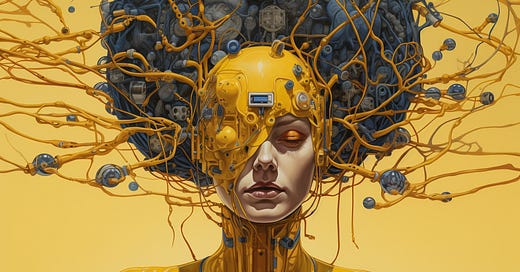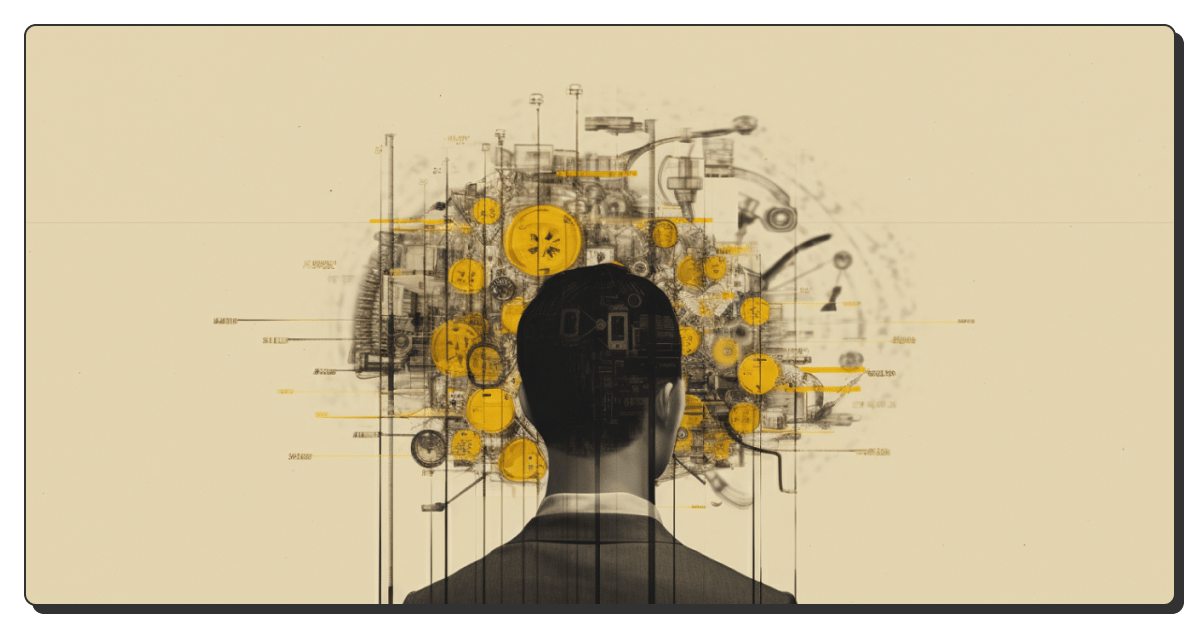The Blueprint of Creativity: From Human Minds to AI models
Decoding the Creative Process and Leveraging AI
Creativity has always been surrounded by myth.
It’s the stuff of dreams and inspiration, the strike of genius, the chasing of muses. A coveted skill that seems only reserved for a few. But is it really? Is creativity an innate gift, or can it be cultivated?
Behind the mystique lies a systematic process that, when understood, can be honed and enhanced.
Creativity is a process, that remains the same whether it’s enacted consciously or subconsciously.
It’s the cycle of curation, ideation, and creation.
Put in simple terms, it’s the act of taking our world in, curating that which we deem most valuable, relating those concepts to come up with novel ideas, and bringing those ideas to life through various mediums.
This is the never-ending cycle humanity has built on across millennia.
An endless sequence of consumption, understanding, and reinterpreting our surroundings, building on top of it and coming up with new creative ideas that move the world forward.
Curation: Building the Foundation
At its core, curation is the art of selection, of filtering through the vast expanse of information and choosing what deserves our attention. This is a constant process we do subconsciously.
Our brains are incapable of processing every single stimulus they come across, so we filter through life in an effort not to become overwhelmed. But the act of curation is very much present.
Every book you've devoured, every film you've watched, every conversation that made you think - they've all contributed to your mental repository. The stories you've lived and witnessed, the cultures you've immersed in; they shape your thoughts, serving as reference points for future ideas.
In order to foster creativity, you must proactively partake in how your brain curates the inputs available to you. You can’t be a passive bystander.
By becoming an active consumer of your desired creative output—like a writer reading various genres or a musician listening to diverse music—you take the first step towards becoming a creator yourself.
Ideation: The Birth of Originality
Ideation is where the magic happens. It's the realm of 'what ifs', of connecting the dots in ways no one has before. And this also takes place subconsciously most of the time.
Instead of engaging in proactive ideation and brainstorming, we usually just wait for our brains to have a seemingly serendipitous stroke of genius. While the whole time, they have been ruminating and iterating on the contents you have fed it until something clicks.
Have you ever experienced a light bulb moment in the shower? Or awakened from a dream with a brilliant idea in mind? That's your brain, working behind the scenes, sifting through the curated content, and drawing unique parallels.
By fostering a curious and questioning mindset, and by employing techniques like mind-mapping or brainstorming sessions, you can proactively tap into this wellspring of innovation.
Creation: Bringing Ideas to Life
Creation is the culmination of the creative process, where ideas take tangible form.
Be it the strokes of a painter, the words of a writer, or the chords of a musician; this phase breathes life into ideation. It's the manifestation of one's inner world.
This is what we most often recognize as the birthplace of creativity as this is the only phase that can’t happen subconsciously.
It’s probably the hardest as it demands more than just the inception of an idea; it requires skill mastery in the chosen medium, and creators must grapple with the pitfalls of perfectionism, the vulnerability of exposing their work to critique, and the emotional ebb and flow intrinsic to the process.
Yet, despite these challenges, the act of creating is profoundly rewarding. It stands as a testament to human resilience, ingenuity, and our indomitable drive to express and innovate.
The AI Revolution
Now, as dystopian as it might seem to some, we’ve built machines that can go through this very same process. In a reflection of our own capacity, we've designed them in our likeness.
Much like us, AI systems thrive on data. Their prowess is determined by the quality and diversity of datasets they're trained on. Feed an AI with rich, varied information, and it becomes a more nuanced problem solver. It's their version of reading a good book or experiencing a transformative event. Nothing gets past them, and with clear directives of what’s relevant, they are perfect curators.
When faced with a query, looking to solve a problem, AI dives deep into its training, drawing patterns and making connections, ideating, at lightning speed. And while it lacks the emotional eureka of human inspiration, it compensates with precision and scale.
And finally when it comes to creation, whether it's generating a photo, composing music, or answering complex queries, the AI, for now, relies on the human to make the most out of it’s amazing capacity to look at and understand their vast data sources.
AI’s output is only as good as the data we feed it and the tasks we ask of it.
But how is that any different than the human brain?
Isn’t our own “input” only as good as the information we seek, and our “output” only as good as how skilled we are at using our available “inputs”?
The Interplay of Creativity
Technology is a tool. And it’s up to us to decide what we do with it.
Both human minds and AI systems embark on this creative journey. From gathering knowledge to brainstorming ideas and finally, manifesting them—the steps are strikingly similar. Yet, the soulful essence, the emotional layers of human creativity, remain unmatched. Emotions like love, sorrow, joy, and despair have birthed some of the most profound creative works, something AI doesn't experience in the same way.
Creativity, in its myriad forms, paints a tapestry of progress, be it in art, technology, or everyday problem-solving. As we stand at the crossroads, with AI evolving by leaps and bounds, one can't help but wonder: What's the future of creativity?
The future of creativity remains inherently human. But we should embrace AI as a way to bypass our own limitations.
Our limitations to go through the insane volume of content we are flooded with on a daily basis.
Our limitations to remember our own catalog of curated sources to make sure we don’t lose valuable information that can make our ideas even better.
Our limitations to learn to execute every medium with enough proficiency to bring our ideas to life.
As we continue our creative journeys, how will you harness both the innate power of your human mind and the vast potential of AI to forge a path of true innovation?
As the lines between human creativity and AI continue to blur, how will you ensure that your voice remains unique, authentic, and heard?










